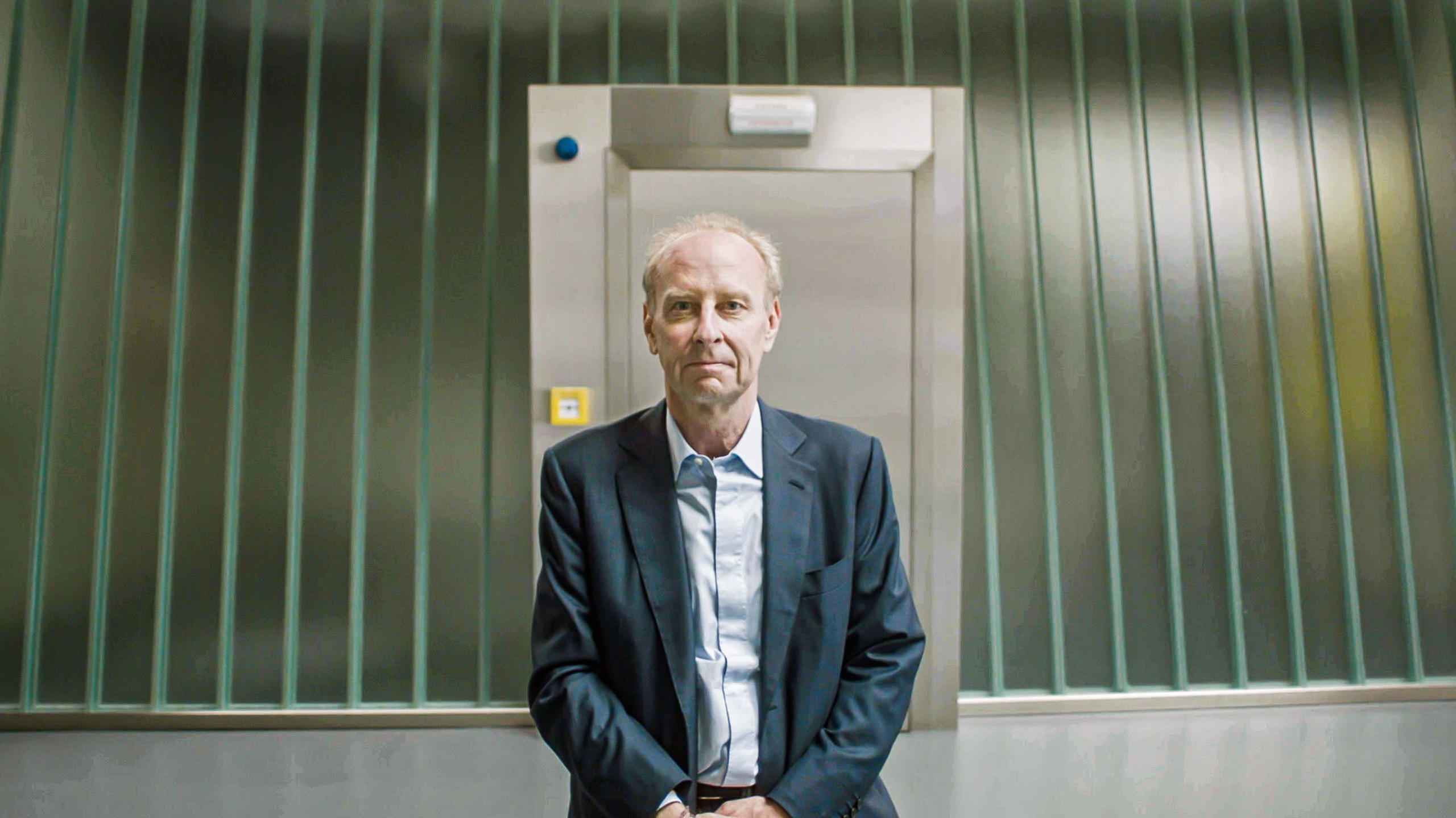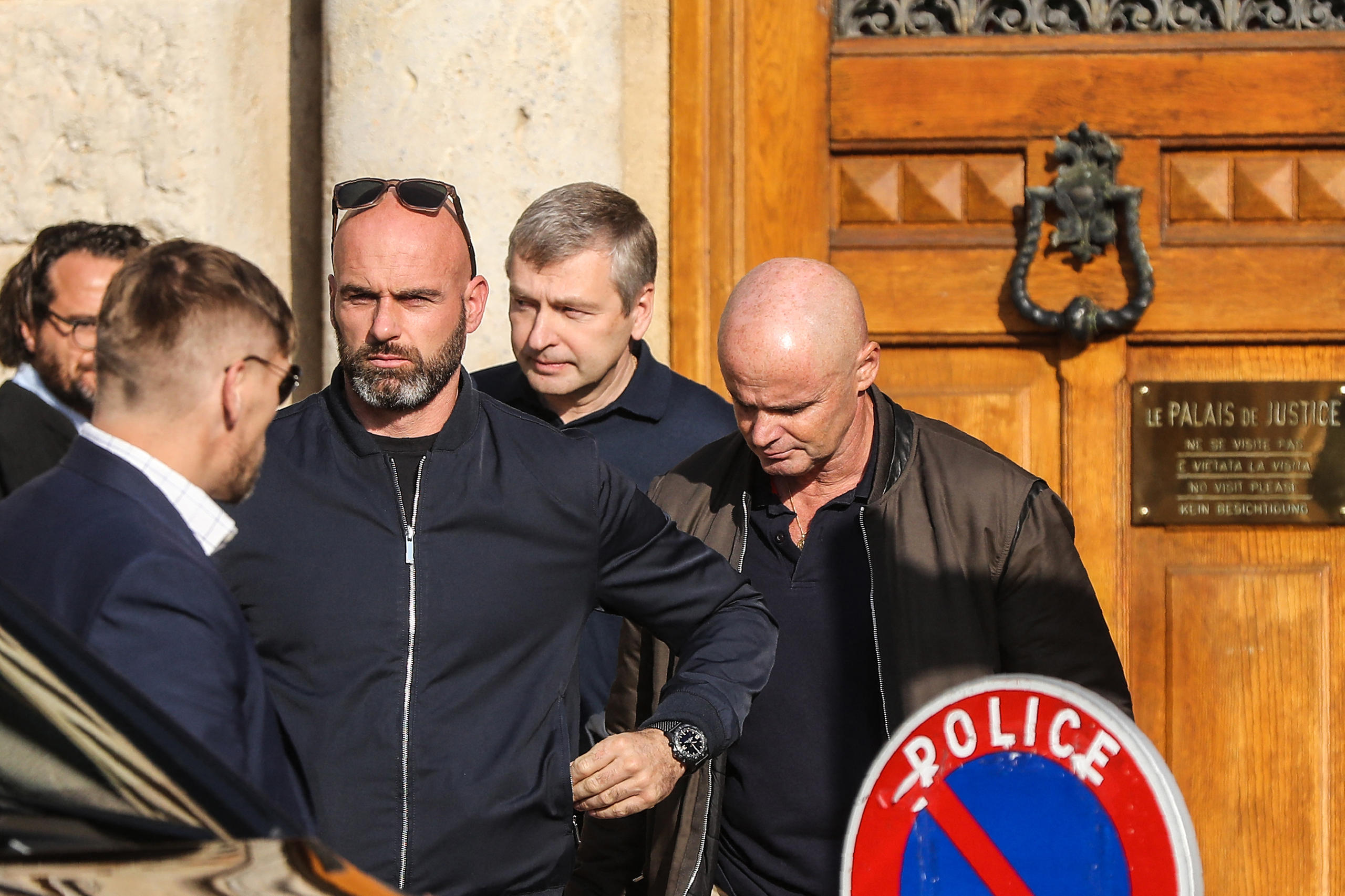
A call girl and a tax man walk into a bar…

Can the Federal Tax Administration rely on information it knows was obtained illegally to recover CHF165 million ($185 million) in taxes?
One case, which has been running since 2015, involves a senior tax official in Bern, the art dealer Yves Bouvier, an Argentinian call girl and, indirectly, the Russian billionaire Dmitry Rybolovlev, a resident of Monaco.
Published in late 2022 in Paris, a small book with a red cover titled Cellule 381. Archives d’une escort-girl internationale (Cell 381. The Archives of an International Escort) went virtually unnoticed. Its author is Maria Roma, the pseudonym of a 51-year-old escort who spent more than a year in prison at Champ-Dollon in Geneva. In 2018 she was caught stealing credit cards from letterboxes in the city’s upmarket districts.
In her book, Roma, recounts how she made contact with a “tax agent” in September 2017 at the Grand Hôtel des Bains in Yverdon, and how the next month she handed him documents she had stolen. These exchanges lasted until May 2018, when she was caught red-handed.
Roma, whose real identity is known to SWI swissinfo.ch, agreed to meet us in Geneva. To confirm her written account, she provided us with emails exchanged with a senior official of the Swiss Federal Tax Administration. They attest to an ongoing relationship and a certain familiarity between the two protagonists.
While Roma admits to stealing credit cards and pin codes to earn a living, she does not specify the nature of the documents she sent to the Federal Tax Administration.
Legal exchange of information?
These exchanges raise the question of whether a Swiss tax agent, whom we know to be senior after checking the emails, can use stolen documents to conduct a tax-fraud investigation.
Examples of the emails we have been able to read suggest that the person to whom Roma is writing suspects that the documents were not acquired legally.
“I have received your USB stick, thank you. I would also ask you NOT to use my titles and functions for private purposes. I would not, in any case, be able to intervene in these matters,” the tax officer wrote on April 26, 2018.
In another he gets familiar and concludes with “good night” and a smiley face with a tongue hanging out the side.
Swiss tax law is unclear, leaving a lot of room for interpretation on how an agent can obtain documents. They can be obtained illegally if it is in the public interest to do so.
On October 2, 2007, the Federal Court ruled in favour of canton Bern, which had imposed a tax fine on a taxpayer using “illegally obtained” information. The case concerned a theft from a major law firm in Liechtenstein. The court ruled that “if the taxpayer does not himself provide the information necessary to establish his tax liability, the tax authorities may demand it directly from the ‘third parties’ involved: asset managers and trustees, for example”.
“The Swiss tax authorities have considerable room for manoeuvre. But does the system allow them to go as far as using illegally obtained data?” asks a Swiss tax lawyer, speaking on condition of anonymity. “I would also like to add a nuance: what is permissible for an ordinary employee is less so in the case of a civil servant at the top of the hierarchy, who must behave irreproachably. In this particular case, we have to ask ourselves whether a red line has not been crossed.”
Honey trap
This affair is not limited to mailbox thefts. Roma is said to have had “dealings” with the Swiss art dealer Yves Bouvier. On February 28, 2020, the Heidi News website revealedExternal link that Bouvier had used an escort to “trap a senior Swiss tax official in Paris”. The escort was none other than Roma, whom the website named Sarah.

At the time, the Swiss tax authorities were on Bouvier’s trail for tax fraud. The former freeport magnate is suspected by the Criminal Affairs and Investigations Division – the armed wing of the Federal Tax Administration – of living in Switzerland, despite his claims to have been domiciled in Singapore since 2009. The Federal Tax Administration accuses him of evading CHF165 million in taxes.
The art dealer allegedly instructed Roma to approach the tax official at a tax conference in Yverdon in September 2017 in order to seduce him – and to eventually convince him to accompany her to one of Bouvier’s flats in Paris in order to recover documents compromising to Bouvier. The trip to Paris by the tax official would then have led to a procedural irregularity and cleared Bouvier, as the Swiss tax authorities do not have the right to investigate abroad.
Bouvier has always denied being behind any such plot.
In the end, this attempted honey trap didn’t work out. Roma says she became angry with Bouvier, without specifying why, and preferred to tell the tax official everything – and then collaborate with him.
Roma admits in her book that she agreed to record Bouvier without his knowledge and to pass on the transcripts to the tax official in charge of the case. In other words, to the same tax official to whom she handed documents stolen from letterboxes.
International interest
This raises another question about the legality of their discussions: are tax secrecy rules breached if a civil servant discusses a case they are investigating with an outsider, in this case, Roma?
In answer to questions put by SWI swissinfo.ch, the Federal Tax Administration simply said by email that it is bound by tax secrecy, and neither the authority – nor its employees – “comment on specific taxpayers”.
While Swiss law leaves room for interpretation, this case is of interest beyond Switzerland’s borders.
In France, the legal framework in such a case is more clearly defined. According to Patrick Michaud, a Paris tax lawyer, when it comes to documents obtained illegally, “the key issue is the fairness of the evidence. If, for example, a whistleblower has stolen documents from his company because he believes that tax evasion is unacceptable, the information obtained, even if illegally, can be used. But if the theft is carried out by an employee who wants to take revenge on his boss for making him redundant, that doesn’t hold water”.
In Switzerland, on the other hand, the tax authorities do not examine the motives of employees who steal documents.
For lawyer Gilles-William Goldnadel, a star of the Parisian bar, “the line should be drawn between a flexible tax system and a rigid criminal justice system. But in this very colourful situation, the tax evader should get away with it”, he believes.
Yacine Rezki, Bouvier’s lawyer, asks: “Can the authorities really be unaware that Yves Bouvier was tricked and the documents were gathered using illegal means, including unauthorised recordings?” Roma confirms that a recording took place between 3.40pm and 4.20pm in a café next to a bank in Geneva.
The Russian billionaire
One betrayal followed the next. Not only did Roma shop Bouvier to the tax authorities, but on November 6, 2017 she contacted Tetiana Bersheda, a lawyer representing Dmitry Rybolovlev, Bouvier’s worst enemy.
Since January 2015 Rybolovlev, the chairman of football club AS Monaco, has been waging an international legal war against Bouvier, accusing him of overcharging more than CHF1 billion for the paintings he sold him (see box).
In the early 2000s Swiss art dealer Yves Bouvier met Russian oligarch Dmitry Rybolovlev in Geneva. He helped him build one of the world’s finest collections of works by Gauguin, Van Gogh, Picasso and Rothko – 38 paintings worth CHF2 billion. But in January 2015 Rybolovlev filed a complaint against the Swiss dealer in Monaco, accusing him of swindling him out of CHF1.2 billion. Since then, the two businessmen have been battling it out in courts across continents: in Monaco, where Rybolovlev lives, Geneva, Singapore and New York.
In this battle between a billionaire (Rybolovlev) and a millionaire (Bouvier), the latter has scored some points. In Monaco in 2019, then in Geneva in 2021, the Federal Prosecutor’s Office dismissed Rybolovlev’s criminal complaint. But in 2022 the criminal appeal chamber of the Geneva Court of Justice ordered the prosecutor’s office to re-open the case. Rybolovlev is also suing Sotheby’s in the United States, accusing the auction house of helping Bouvier overcharge for certain works of art.
In her book, Roma admits that she “went over to the enemy”, writing to the Russian billionaire’s lawyer: “Kindly pass this message to DR [Dmitri Rybolovlev]: I think we should talk. I might be your lucky card.”
For Rezki, Bouvier’s lawyer, the email exchanges suggest that Bouvier’s main adversary “possibly” contacted the Swiss tax authorities through Roma.
For his part, Bouvier has made no secret of his indignation. “I have the right to know whether our tax authorities allowed themselves to be influenced by a Russian oligarch. Do I have no right to an impartial investigation and a fair trial in my own country?”
Rybololev’s lawyer, Tetiana Bersheda, did not respond to our requests.

Prison sentence
On May 26, 2018, in Chêne-Bougeries in canton Geneva, Maria Roma was caught by a caretaker and arrested by the police. Her contacts with the tax officer did not save her from prison.
“However, as we do not know how these documents were obtained, they cannot be used by our services as they stand: the same will apply to any documents you may produce in the future,” the tax agent wrote to her after her arrest.
On May 31, 2023, the magistrates’ court found Roma guilty of theft by profession, unlawful appropriation, fraudulent professional use of a computer, swindling and forgery of documents, and sentenced her to 24 months in prison (minus the 17 months spent in pre-trial detention). Roma, who did not attend the trial, has decided to appeal.
Edited by Virginie Mangin/ts. Translated from French by Catherine Hickley

In compliance with the JTI standards
More: SWI swissinfo.ch certified by the Journalism Trust Initiative




























You can find an overview of ongoing debates with our journalists here . Please join us!
If you want to start a conversation about a topic raised in this article or want to report factual errors, email us at english@swissinfo.ch.